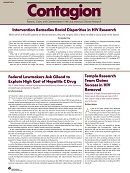Publication
Article
Contagion
Are Hospital-acquired Conditions Inherent in Bariatric Surgery?
Author(s):
The patients who are most likely to develop a hospital-acquired condition after bariatric surgery are precisely those who stand to benefit the most from undergoing the procedure

As the US Centers for Medicare and Medicaid Services (CMS) remains deeply concerned about hospital-acquired conditions (HACs) that can reasonably be prevented through the application of evidence-based guidelines, the agency does not reimburse healthcare facilities for 11 HAC categories, including surgical site infections (SSIs), urinary tract infections (UTIs), and venous thromboembolism (VTE) that are common among patients who undergo bariatric surgery.
In a study presented at the SAGES 2014 Annual Meeting, researchers from the&Johns Hopkins University School of Medicine examined the rate of HACs in bariatric surgery patients, as well as the effects HACs have on their postoperative outcomes. Using the American College of Surgeons’ National Surgical Quality Improvement Program (ACS-NSQIP) database, the investigators identified 98,553 obese adults who underwent bariatric surgery between 2005 and 2012.
Among the study population, 2,809 (2.9 %) patients developed at least one HAC. According to the researchers, SSI was the most common HAC(1.8%), followed by UTI (0.7%) and VTE (0.4%). Nevertheless, the authors reported a temporal decline in HACs, as 4.6% of patients had HACs in 2005, but that rate decreased to 2.5% in the study’s final year. They also found the presence of comorbidities and higher body mass index (BMI) increased a bariatric surgery patient’s risk of developing an HAC.
Although patients who had laparoscopic gastric banding were least likely toexperience an HAC (1.3%), those who underwent open gastric bypass had a 5.36-fold higher risk of developing an HAC. Consequently, bariatric surgery patients who developed an HAC had significantly higher rates of in-hospital mortality and longer lengths of stay.
Surprisingly, the presence of a resident surgeon 7—11 years post-graduation was associated with a spike in HAC risk, which the researchers attributed to longer operative times when residents are involved in procedures, greater surgical complexity in the studied cases, or less experienced staff.
The patients most likely to develop a HAC after bariatric surgery are precisely those who stand to benefit the most from undergoing these procedures,the authors wrote, noting that many HACs included in CMS’s payment provision are related to intrinsic factors among bariatric surgery patients. Thus, they concluded surgeons have minimal ability to impact the incidence of HACs in this patient population.






